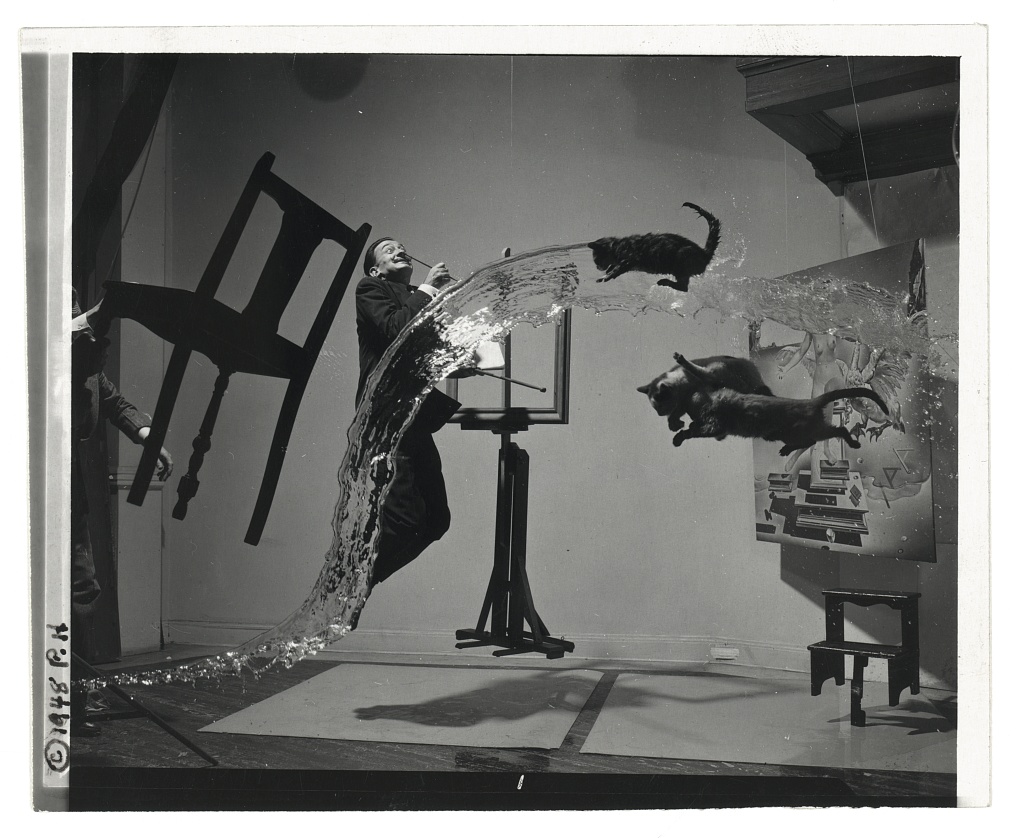With his cane, his famous waxed mustache, and his habit of taking unusual animals for walks, Salvador Dalí would appear to have cultivated his own photographability. But taking a picture of the man who stood as a living definition of popular surrealism wasn’t a task to be approached casually — especially not for Philippe Halsman, who did it more than anyone else. Originally from what’s now Latvia, he led a turbulent life that eventually (after a couple of interventions by none other than Albert Einstein, of whom Halsman later made a famous portrait) brought him to the United States. It was in New York, in 1941, that he met Dalí, having been assigned to photograph one of his exhibitions in the city.
Halsman had more opportunities to photograph Dalí, and these jobs turned into decades of collaboration. Its many fruits include a book containing 36 views of the artist’s mustache alone, but also the more ambitious — and much more surreal — image Dalí Atomicus, from 1948. Inspired by the work-in-progress that would become Leda Atomica, a portrait of Dalí’s wife Gala influenced by both mythology and science, the photograph includes not just that painting, but also an arc of water and three flying cats. Or at least they look like they’re flying; in reality, they were thrown into the frame by a team of assistants including Halsman’s wife and his young daughter Irene.
Irene Halsman recalls the experience in the BBC Time Frame video above, including the now-widely known detail that Dalí’s own initial concept for the photo involved blowing up a duck with firecrackers. “Oh, no, no, you can’t do that,” she recalls her father responding. “You’re in America now. You don’t want to be put in jail for animal cruelty.” So flying cats it was, to be visually captured in mid-air along with the contents of a bucket of water. Leda Atomica and a chair were also made to appear as if levitating, and Dalí himself was instructed to jump, in an instance of the photographic practice Halsman called “jumpology” (whose other subjects included Audrey Hepburn, J. Robert Oppenheimer, Marilyn Monroe, and Richard Nixon).

Image via Library of Congress
Dalí Atomicus was published in Life magazine, to which Halsman was a prolific contributor. The same issue included a few outtakes, which revealed some of what went into the five-to-six-hour-long process of nailing the shot. You can see a few such prints at Artsy, whose labeled faults include “water splashes Dalí instead of cat,” “Dalí jumps too late,” and “secretary gets into picture.” But it wasn’t all just about timing: the picture also required a degree of pre-Photoshop editing to perfect, and the empty canvas behind the jumping Dalí had to be filled in by the rush of the man himself, who opted to fill the non-existent painting with motifs drawn from the limbs of the cats. Now there was an artist who knew how to seize inspiration when it floated by.
Related Content:
A Soft Self-Portrait of Salvador Dali, Narrated by the Great Orson Welles
Salvador Dalí Explains Why He Was a “Bad Painter” and Contributed “Nothing” to Art (1986)
Salvador Dalí Takes His Anteater for a Stroll in Paris, 1969
When Salvador Dalí Created Christmas Cards That Were Too Avant Garde for Hallmark (1960)
Based in Seoul, Colin Marshall writes and broadcasts on cities, language, and culture. His projects include the Substack newsletter Books on Cities and the book The Stateless City: a Walk through 21st-Century Los Angeles. Follow him on the social network formerly known as Twitter at @colinmarshall.


The only thing I know about that picture is that none of those cats were happy.